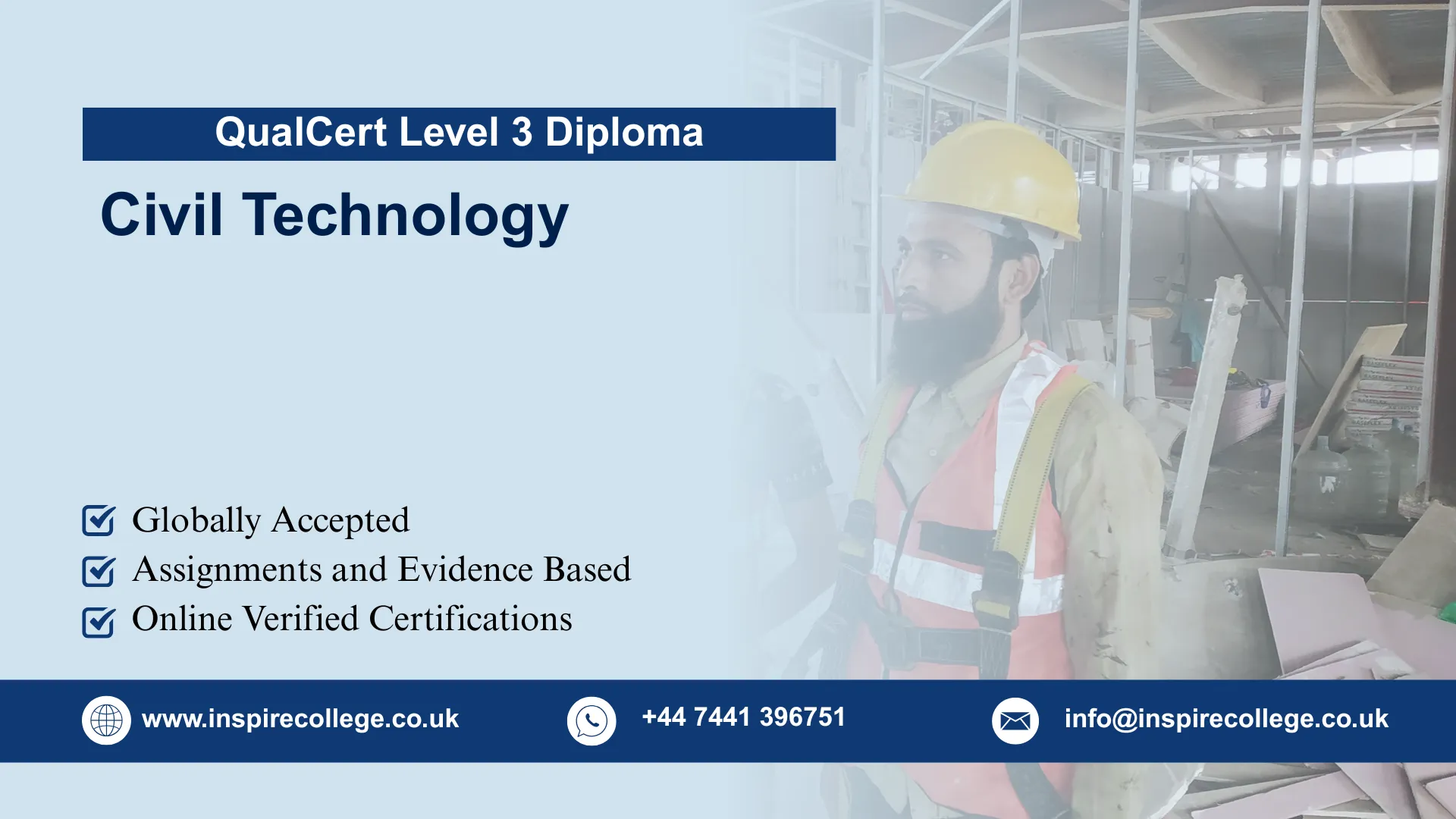
QualCert Level 3 Diploma in Civil Technology
Civil technology and engineering are fundamental to the development, maintenance, and advancement of modern infrastructure. The QualCert Level 3 Diploma in Civil Technology is an advanced qualification designed to equip learners with comprehensive technical knowledge and practical expertise necessary for professional roles in civil engineering, construction, and infrastructure management. QualCert Level 3 Diploma in Civil Technology bridges the gap between foundational skills and higher-level technical proficiency, preparing learners for complex projects and leadership opportunities within the sector.
The purpose of QualCert Level 3 Diploma in Civil Technology is to provide learners with in-depth understanding of advanced civil technology concepts, including structural analysis, geotechnical engineering, project management, surveying, and sustainable construction practices. Participants will develop the ability to plan, design, and execute civil engineering projects with a strong emphasis on accuracy, safety, and efficiency. Through a combination of theoretical learning and practical application, learners will gain the skills required to solve real-world engineering problems and contribute effectively to multidisciplinary project teams.
Upon completion of the Level 3 Diploma, learners will be capable of interpreting complex engineering drawings, conducting advanced surveying and site assessments, managing construction resources, and applying engineering principles to ensure structural integrity and project success. Graduates will be prepared for roles such as civil engineering technicians, site supervisors, CAD specialists, and construction project coordinators, while also laying the foundation for further professional development and higher education in civil engineering and related fields.
To ensure that learners can fully engage with the course content and successfully benefit from the advanced curriculum, the following entry requirements have been established for the Level 3 Diploma in Civil Technology. These criteria are designed to prepare participants for the academic and practical demands of the program:
- Minimum Age Requirement: Candidates must be at least 18 years of age at the time of enrolment. This ensures that learners have the maturity, focus, and commitment necessary to undertake an advanced technical qualification.
- Educational Background: Applicants should have completed a high school diploma or an equivalent qualification, such as a GED. Some training providers may specify completion of secondary education to guarantee that learners possess foundational academic skills, including numeracy, literacy, and problem-solving, which are essential for understanding complex civil technology concepts.
- Language Proficiency: Proficiency in the language of instruction, typically English, is essential. Learners must be able to comprehend detailed technical materials, actively participate in discussions, complete written assignments, and communicate effectively with instructors and peers. Strong language skills support full engagement with both theoretical and practical aspects of the course.
- Industry Experience (Recommended): While not always mandatory, learners with prior experience in construction, civil engineering, or related industries may find it easier to contextualize advanced concepts such as quality control, site management, and structural analysis. This experience can enhance understanding and practical application.
- Foundational Training (Recommended): Although not a strict requirement, completion of a Level 2 Diploma in Civil Technology or an equivalent foundational program is highly recommended. Prior training provides learners with essential knowledge of basic civil technology principles, tools, and terminology, allowing them to transition smoothly into more advanced topics and practical applications.
By meeting these entry requirements, learners are well-positioned to maximize their learning experience, develop advanced technical skills, and prepare for professional roles or further education in civil engineering, construction, and related fields.
Mandatory Units
The QualCert Level 3 Diploma in Civil Technology is a 60-credit qualification with a Total Qualification Time (TQT) of 300 hours, including 210 Guided Learning Hours (GLH). This course is thoughtfully designed to provide targeted and efficient skill development in the field of Civil, offering learners a solid foundation to build their expertise.
Mandatory Units
Upon successful completion of the Level 3 Diploma in Civil Technology, learners will have developed advanced technical knowledge, practical skills, and problem-solving abilities applicable to complex civil engineering and construction projects. The course prepares graduates for professional roles, equipping them with expertise in structural design, transportation, water resources, geotechnical engineering, and project management.
1. Advanced Structural Design
Learners will:
- Analyze and design complex structural systems in accordance with national and international engineering codes and standards.
- Evaluate the performance of construction materials under diverse loads and environmental conditions.
- Apply advanced engineering techniques to optimize structural safety, durability, and sustainability.
- Utilize modern software tools for structural modeling, analysis, and design, enhancing efficiency and accuracy.
2. Transportation Engineering
Learners will:
- Understand the principles of transportation systems, including road networks, rail systems, and urban transit planning.
- Design efficient, safe, and environmentally sustainable transportation infrastructure.
- Evaluate traffic flow, operational safety, and environmental impacts of transportation projects.
- Develop data-driven solutions to address transportation challenges and optimize system performance.
3. Water Resources Engineering
Learners will:
- Analyze water resource systems, encompassing hydrology, hydraulics, and watershed management.
- Design effective water supply, drainage, and irrigation systems for urban and rural applications.
- Assess environmental and social impacts associated with water resource projects.
- Apply modern tools and simulation techniques for water resource planning and management.
4. Geotechnical Engineering
Learners will:
- Evaluate soil and rock properties for civil engineering and construction applications.
- Design foundations, retaining structures, and earthworks using geotechnical principles.
- Assess slope stability and propose remedial measures to mitigate geotechnical risks.
- Integrate geotechnical considerations into the planning, design, and execution of construction projects.
5. Construction Economics and Management
Learners will:
- Analyze economic factors affecting construction projects, including cost estimation, budgeting, and resource allocation.
- Develop comprehensive project management plans covering scheduling, workforce deployment, and risk mitigation.
- Evaluate the financial feasibility of projects using cost-benefit analysis and other assessment tools.
- Understand legal, ethical, and contractual aspects relevant to construction management.
6. Capstone Project in Civil Technology
Learners will:
- Apply theoretical knowledge to plan and execute a real-world civil engineering project.
- Demonstrate critical problem-solving, teamwork, and professional project management skills.
- Conduct research, analyze technical data, and propose innovative solutions to engineering challenges.
- Present project findings in a professional manner through technical reports, presentations, and visual documentation.
The Level 3 Diploma in Civil Technology is specifically designed for learners who aim to develop advanced technical expertise and excel in the civil engineering and construction industry. This course caters to a diverse audience, providing the skills, knowledge, and practical experience required for professional growth, specialization, and further academic advancement.
This course is particularly suitable for:
- Graduates of Level 2 Civil Technology Programs: Learners who have completed a Level 2 diploma in civil technology and possess foundational knowledge will find this course a natural progression for both educational and career development.
- Experienced Construction Professionals: Professionals already working in civil engineering or construction seeking to enhance their expertise, take on complex projects, and move into senior roles will benefit greatly from this advanced training.
- Career-Changers with Relevant Backgrounds: Individuals with prior education or work experience in related fields, such as architecture, construction management, or surveying, who wish to transition into civil engineering and construction technology.
- Engineers and Technicians Aiming for Advancement: Those already employed in engineering or technical roles looking to progress to mid-level positions, such as project managers, structural engineers, or transportation specialists.
- Aspiring Specialists: Learners with an interest in specialized areas such as environmental engineering, geotechnical engineering, or construction management, seeking in-depth knowledge and practical expertise.
- International Students Seeking Advanced Education: Learners from other countries aiming to gain advanced civil technology skills and education relevant to the local industry context.
- Adult Learners and Lifelong Learners: Adults seeking to acquire advanced technical skills, embrace new challenges, and remain competitive in the workforce.
- Future Academics and Researchers: Individuals aspiring to pursue teaching, research, or doctoral studies in civil engineering, using this course to strengthen their academic foundation and research capabilities.
This diploma is ideal for anyone seeking to combine advanced theoretical knowledge with practical application, preparing learners for professional, technical, and leadership roles within the civil engineering and construction sectors.on to help you succeed.
Register Now
FAQs for QualCert Level 1 Diploma in Quality Control (QC)






